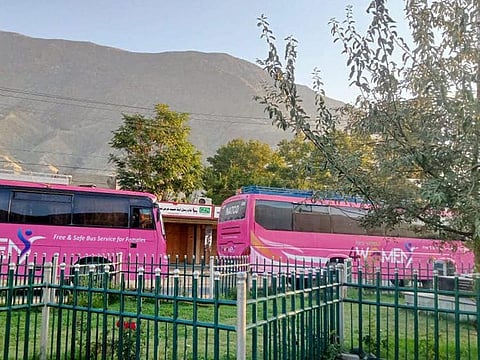Free bus service launched for women in northern Pakistan
Facility aims to improve women’s mobility and safety in Gilgit-Baltistan region

Islamabad: A free-of-cost bus service exclusively for women has been launched in Pakistan’s northern Gilgit-Baltistan (GB) region to improve women’s mobility and safety.
GB Chief Minister Khalid Khursheed officially launched the ‘Pink Bus Service’ this week to increase the usability of public transport for women.
“For the first time in Pakistan’s history, free buses for women have been launched. Three buses each have been made operational in Gilgit and Skardu city, with the government planning to expand it to further areas of the province,” said GB Chief Secretary Mohyuddin Ahmad Wani.
“Female students, doctors, teachers, lawyers and other professionals will benefit from the women-only bus service.”
The transport project has been initiated with three buses and the local government plans to procure more buses to expand the service to more regional areas. The buses will cover four key routes in the Gilgit and Skardu regions between 6am to 9am and 1pm to 3pm.
Addressing safety concerns in public transport
The GB chief secretary said that the authorities are addressing mobility challenges that are critical to enhancing female workforce participation and boosting economic growth. “We want to improve the accessibility of our female citizens by providing free of cost and safe public transport. Now they can travel alone to their educational institutes, workplaces and markets without any hassle.”
Locals welcome the free bus service
Local people have welcomed the initiative of a free bus service for women who used to travel via expensive and often unsafe modes of transport for schools, jobs and other outdoor activities.
“Safety is the key element. Women in this region were less likely to travel alone because sometimes we feel unsafe travelling, especially after dusk” says Sarah Ahmed, a resident of Gilgit city. “But now we can have a safe and comfortable ride for free.”
Suraiya Shah, a college student in Gilgit, appreciated the move but asked the government to extend the timings to facilitate more students. “More buses and extended timings would encourage more women to pursue education or jobs,” she said.
Safe public transport networks are considered essential to improving women’s safety, movement and access to career and other social opportunities. Limited access to and safety of transportation is estimated to be the b obstacle to women’s participation in the workforce in developing countries, according to International Labor Organization (ILO).
Sign up for the Daily Briefing
Get the latest news and updates straight to your inbox


